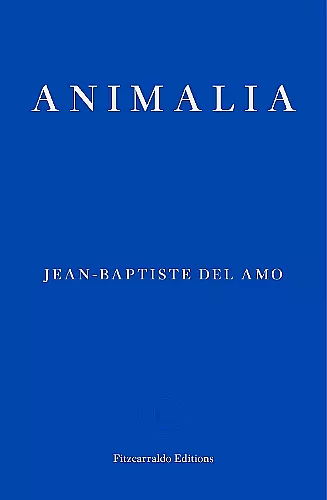Animalia
Jean-Baptiste Del Amo author Frank Wynne translator
Format:Paperback
Publisher:Fitzcarraldo Editions
Published:20th Mar '19
Currently unavailable, our supplier has not provided us a restock date

Animalia retraces the history of a modest peasant family through the twentieth century as they develop their small plot of land into an intensive pig farm. In an environment dominated by the omnipresence of animals, five generations endure the cataclysm of war, economic disasters, and the emergence of a brutal industrialism reflecting an ancestral tendency to violence. Only the enchanted realm of childhood – that of Éléonore, the matriarch, and that of Jérôme, the last in the lineage – and the innate freedom of the animals offer any respite from the visible barbarity of humanity. Written in shifting prose that reflects the passage of time, Animalia is a powerful novel about man’s desire to conquer nature and the transmission of violence from one generation to the next.
‘Animalia is never what you expect it to be [...] Del Amo has Flaubert’s flair for performance [...] His prose leaps out at the reader, gleaming with perfection.’
— Ankita Chakraborty, New York Times Book Review
‘If EM Cioran, the great Romanian philosopher of the bleak, had been a novelist, Animalia is the kind of novel he would have produced [and] it is likely to be hailed as a modern classic. ... Jean-Baptiste Del Amo has published four novels in his native France. Animalia is the first to appear in English, in a translation by Frank Wynne, whose unenviable task it has been to take Del Amo’s original, Règne Animal, and to capture and convey something of its full throttle, bold, dark profundity. He has triumphantly succeeded: Animalia in English has a truly savage quality, all blood and stench and despair. ... Animalia is an important reminder that literature’s task is not necessarily to uplift, but to help us to attain a true understanding of our predicament.’
— Ian Sansom, Guardian
‘This is an extraordinary book. A dark saga related in sprawling sentences, made denser still by obscure and difficult vocabulary, it is everything I usually hate in a novel. Instead, I was spellbound. ... The first half, especially, is full of those dense sprawling sentences, gnarly with obscure words (eclose, muliebral, commensal, ataraxic). This gives the prose an eerie, otherworldly texture. The strangeness of the words, used with precision and scientific exactitude (“lucifugous insects emerge from the mound of earth”), slows your reading down, immersing you more in the scene on the page, and those scenes are so vividly imagined and conveyed — the woman miscarrying in the pigsty, the drunken priest and his attendants slogging up to the farm at night in thunderous rain, the old mother’s body being drawn from the well…’
— David Mills, The Sunday Times
‘Jean-Baptiste Del Amo’s writing positively reeks of pathos, and of rage. Yet for all the acrid pungency of its prose, Animalia pretty much tells an everyday story of country folk. Amid the hills, vales and oak woods of Gers in south-western France, the same family dwells over four generations in a gloomy farmhouse. The plot pivots on two periods: the years before and during the Great War, and the early 1980s. ... The writing ... never loses its electric crackle of sumptuousness and savagery. Ever-resourceful, agile and ingenious, Wynne’s translation proves equal to every twist. Del Amo’s prose throws a bucket of slurry from some “unspeakable mire” over the conventions of pastoral fiction. Yet he has plentiful passages of heart-lifting loveliness, as when an August harvest prompts Marcel to feel nature as “an indissoluble great whole”. From first to last, “the cruelty of men” emits its rancid stench. Thankfully, Del Amo lets us sniff the sweeter scents of tenderness and beauty too.’
— Boyd Tonkin, Financial Times
‘Del Amo’s multigenerational portrait of a hardscrabble family of pig farmers in Gascony is ... a lyrical powerhouse, a sophisticated portrait of a fucked-up feedback loop of familial cruelty and disappointment, and a story that, for all its brutality, also reveals something more. Yes, many of Del Amo’s descriptions will turn you vegetarian for a time, and there is wickedness enough for this book to stand alongside Cormac McCarthy’s meanest, but the brief moments when these beleaguered characters show their humanity and kindness—delivering a calf, bathing a mother—left me breathless.’
— Emily Nemens, Paris Review Staff Picks
‘Throughout, the novel is resolutely and unceasingly foul in its descriptions of sex, death, shit and all manner of bodily processes. Nothing is sentimentalised or sanitised. Del Amo asks his readers to recognise the multiple cruelties that human beings are capable of, and the detail is at some moments extraordinarily difficult to read. At the same time there is an almost celebratory lyricism to the complex biological language in which nature’s processes are described. These descriptions conjure up an oozing sense of time as slow, repetitive and generative ... Animalia is a disturbing and profound book. Del Amo builds such a realistic, richly textured world that by the novel’s close, despite its horrors, it feels a real wrench to leave the landscape.’
— Katie Lewin, Literary Review
‘Gruelling but magisterial, Animalia spans the decades from Eléonore’s childhood to her dotage, telling the tale of this “hostile, implacable land”, and how five generations survive on a single plot of rural soil. Del Amo’s novel is a massive sensory experience; no detail is too small to let ferment.’
— Cal Revely-Calder, The Telegraph
- Winner of Prix du Livre Inter 2017
- Winner of Republic of Consciousness Prize 2020 (UK)
- Short-listed for Lambda Literary Award in Gay Fiction 2020 (United States)
- Short-listed for Best Translated Book Award 2020 (United States)
- Short-listed for Albertine Prize 2020 (United States)
ISBN: 9781910695579
Dimensions: unknown
Weight: unknown
424 pages